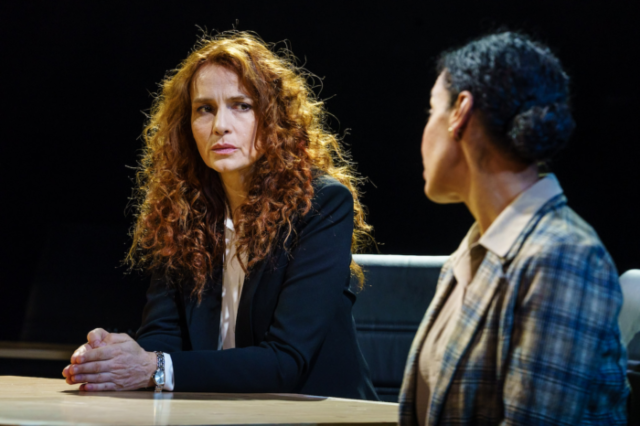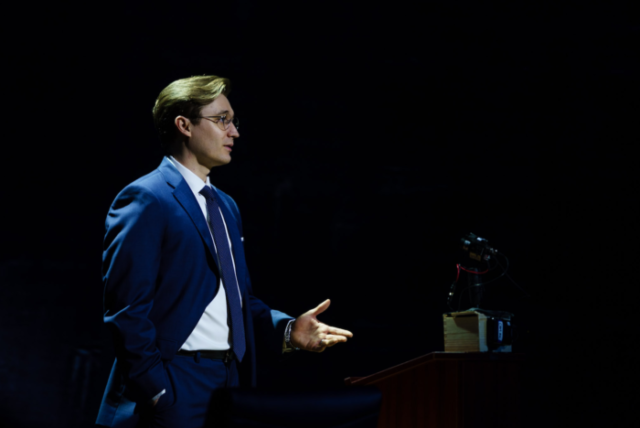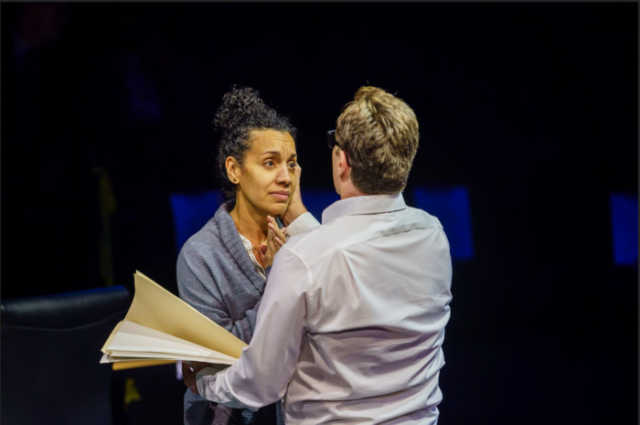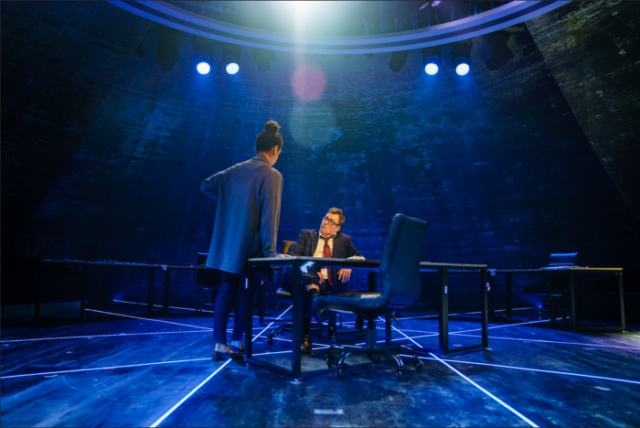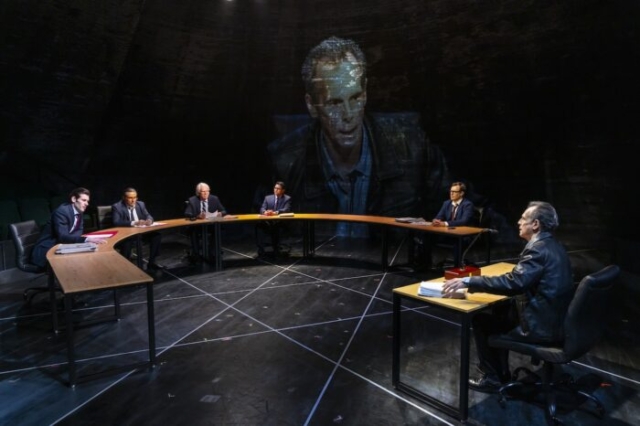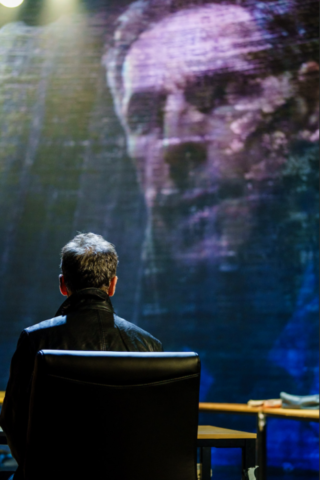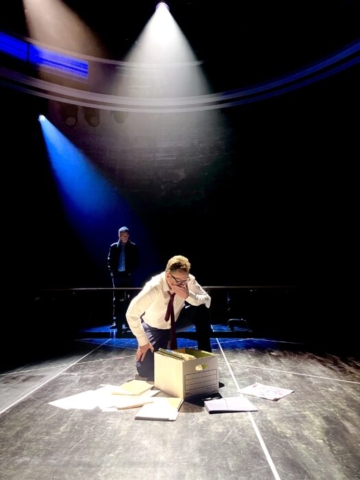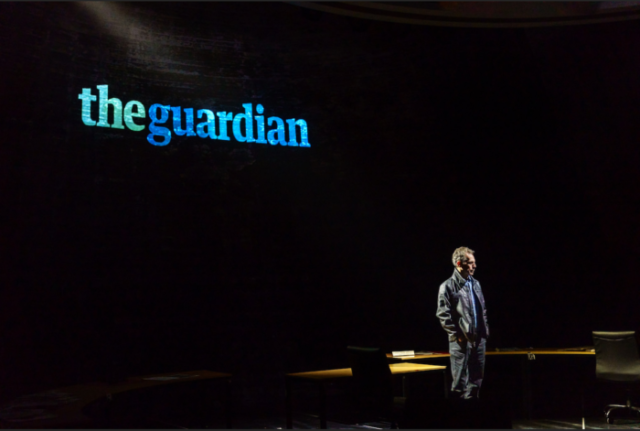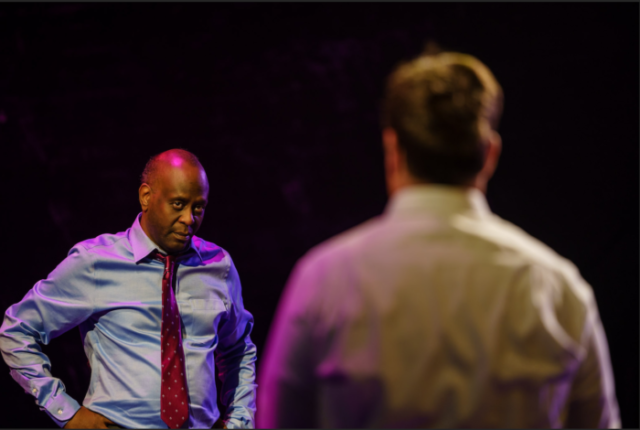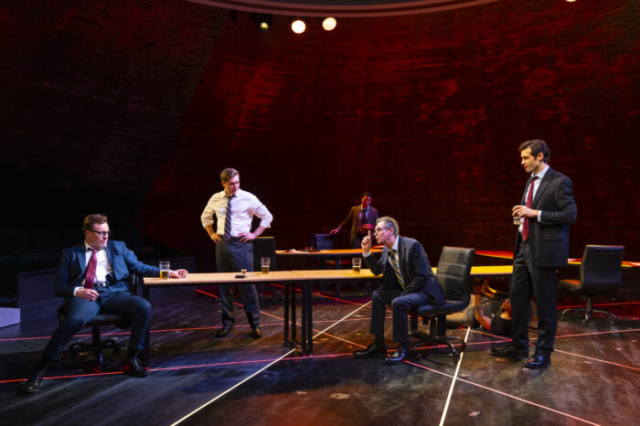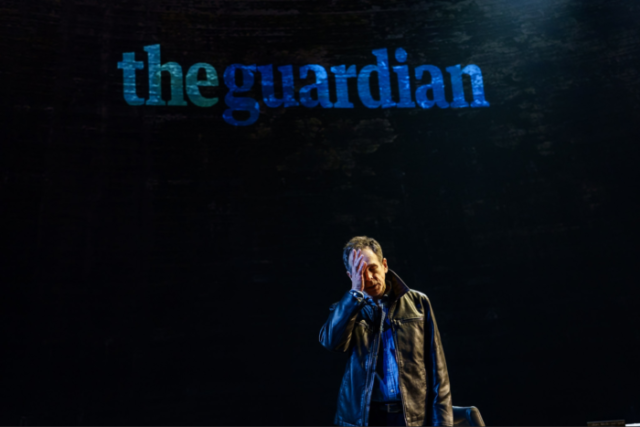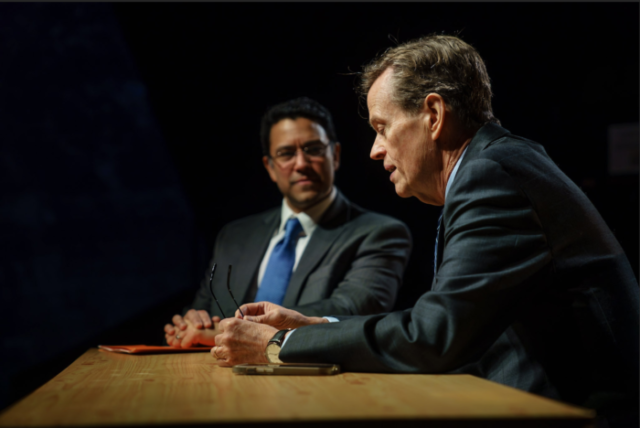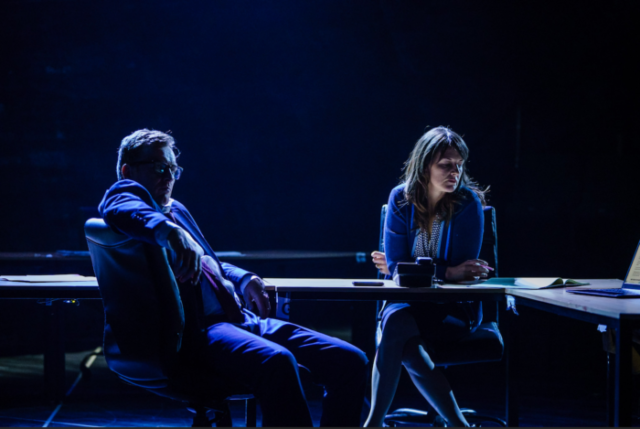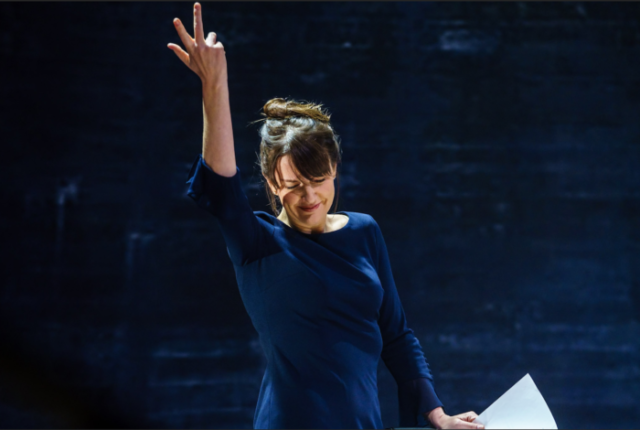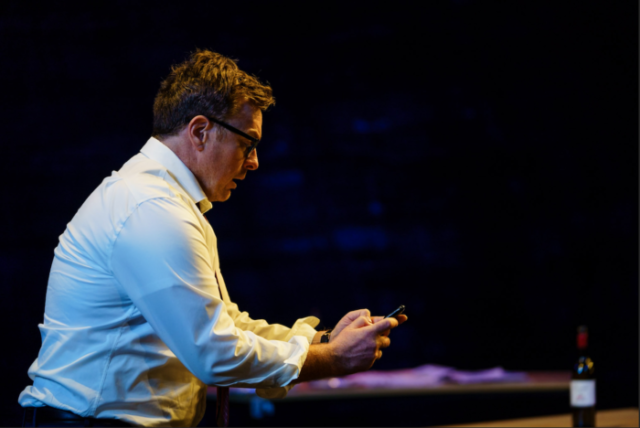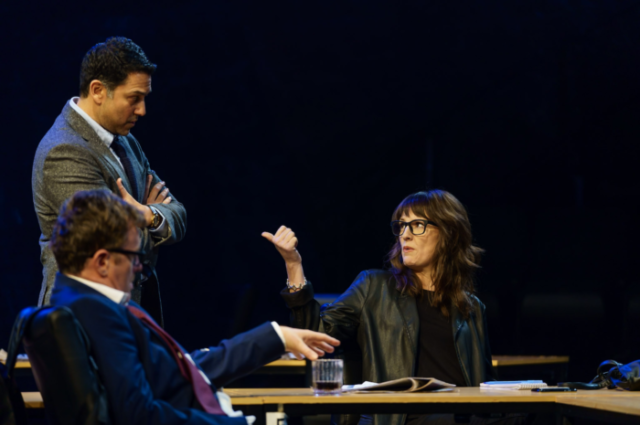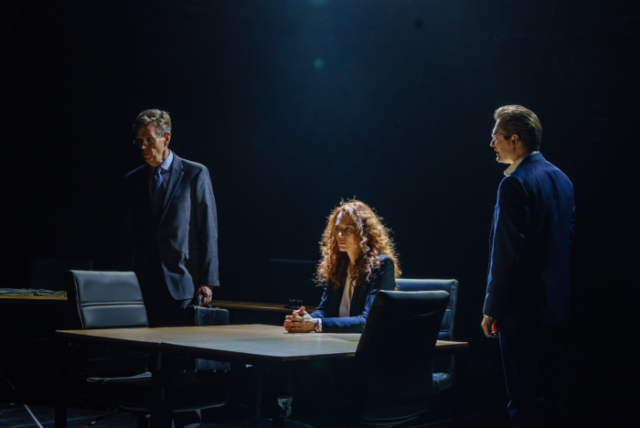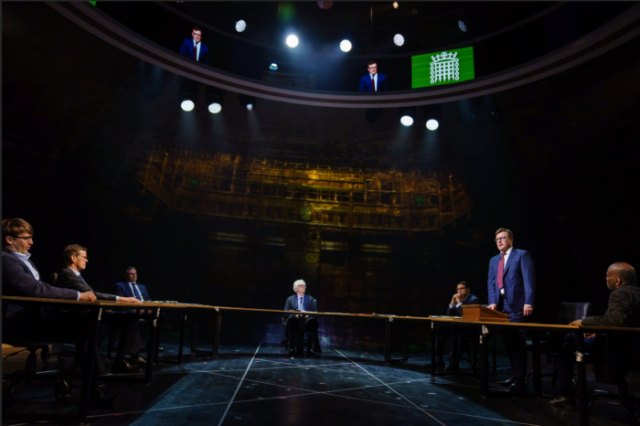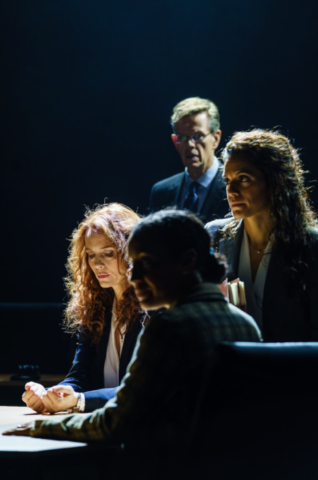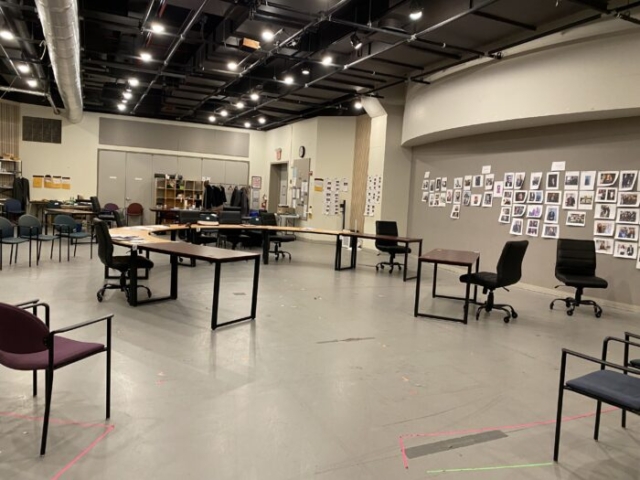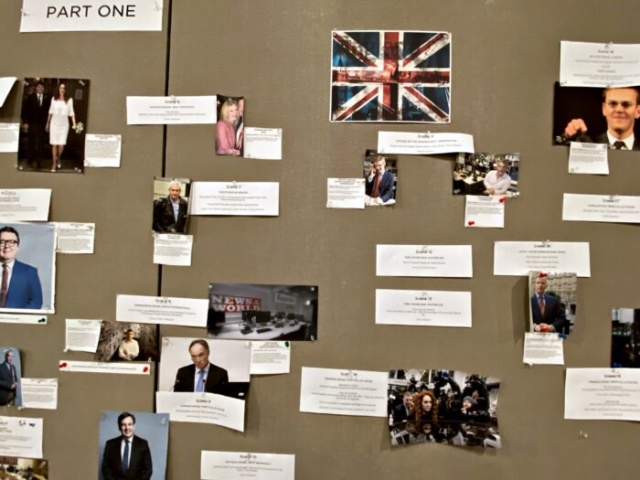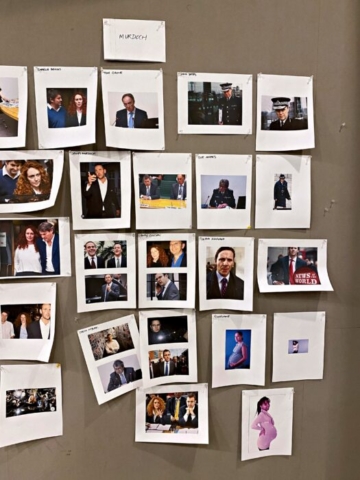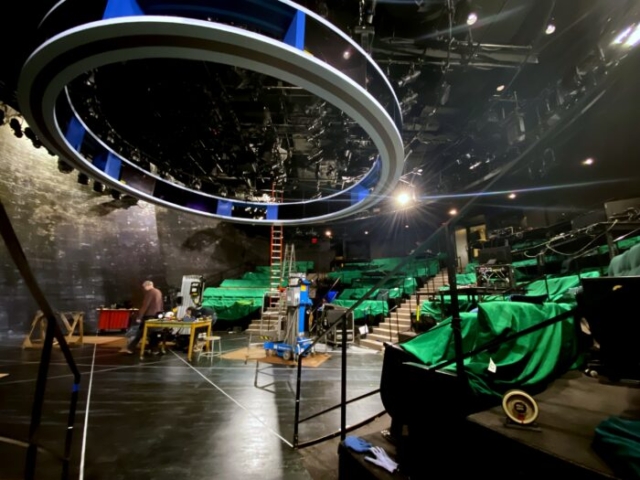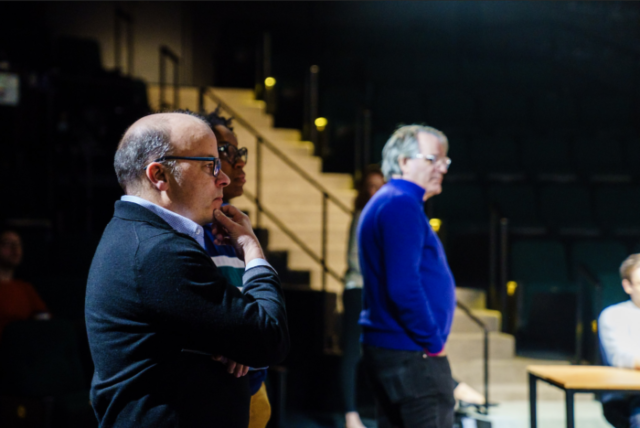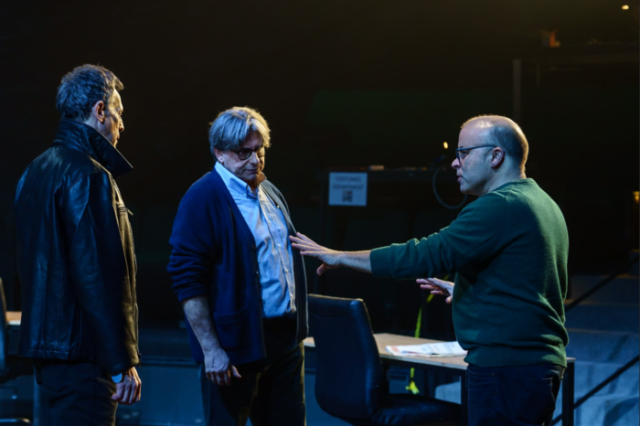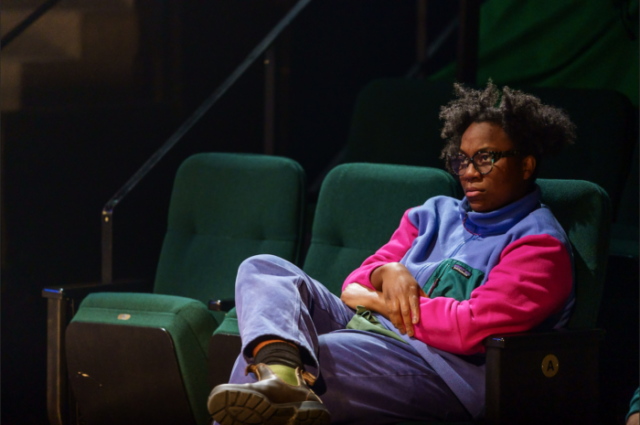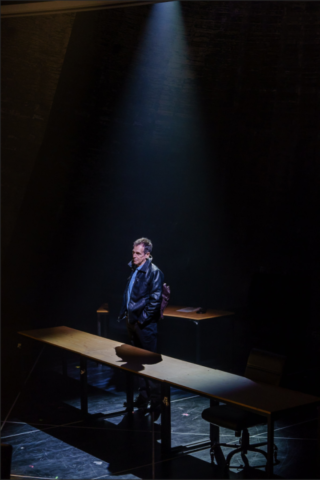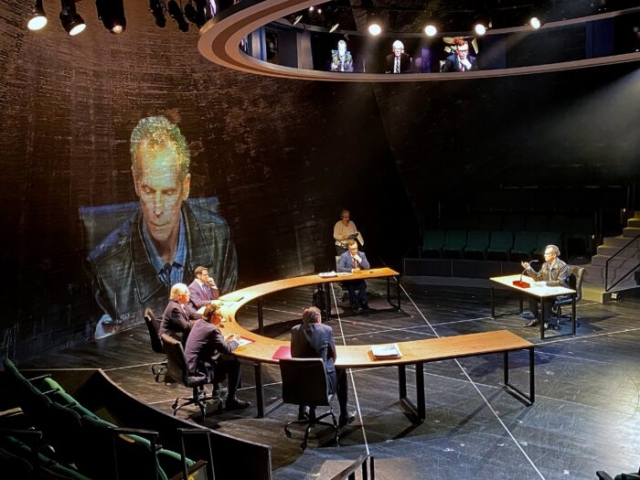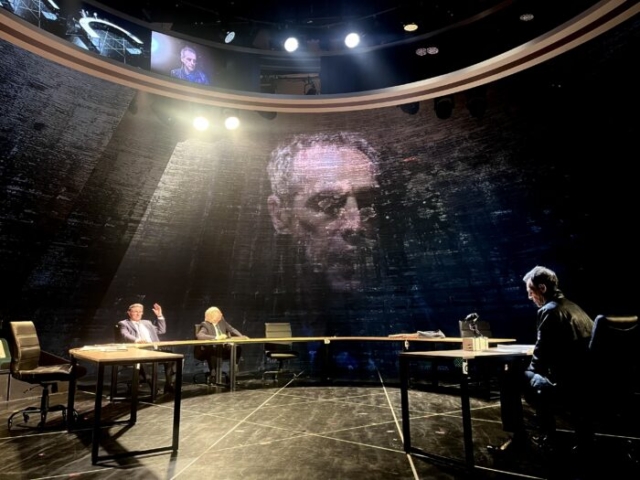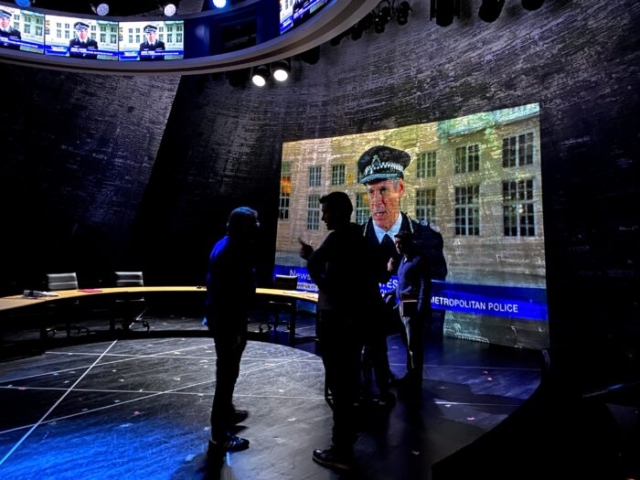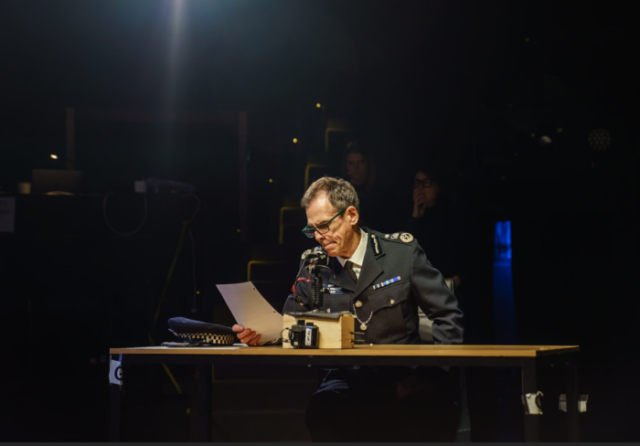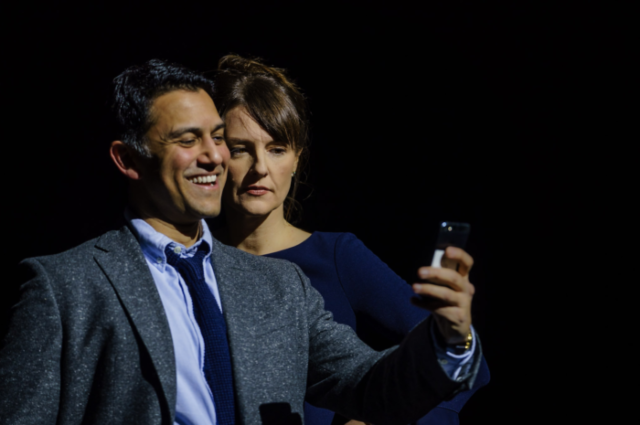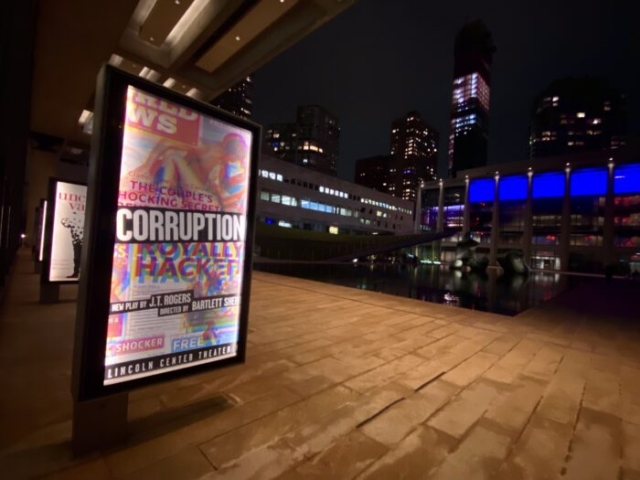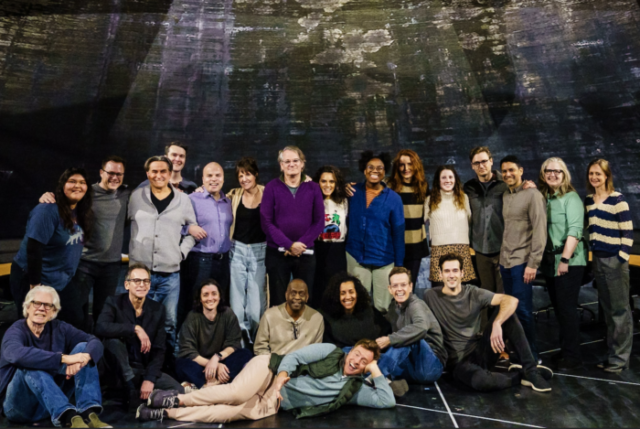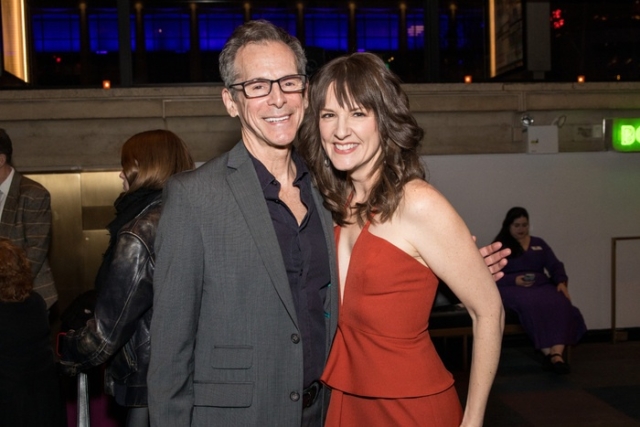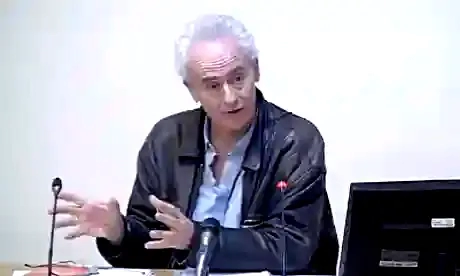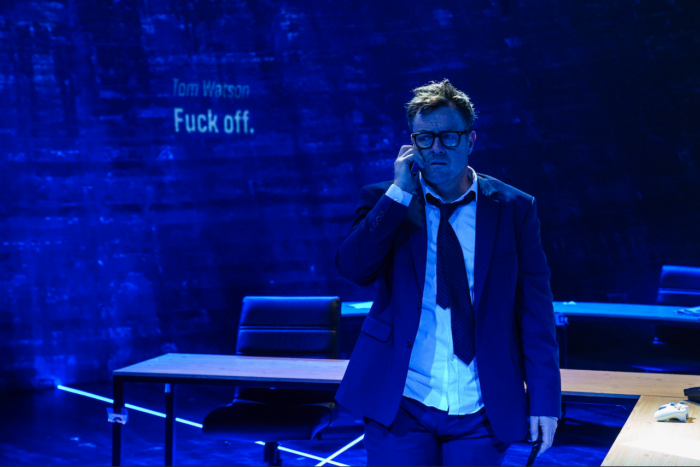
gallery photos by John Behlmann – unless noted
excerpts from the reviews
(full reviews below)
There’s a bare-knuckled political brawl unfolding eight times a week at Lincoln Center and the season is much livelier for it. . . . J. T. Rogers writes punchy, big-canvas accounts of contemporary history, which few American playwrights attempt. We’re lucky that Lincoln Center Theater, Rogers’ home base, supports his works, with their teeming casts of characters and pugilistic thrills, not to mention his candid eye for the world’s workings. . . . Swirling around the lead characters of Rebeckah Brooks and Tom Watson is a universe of predators, victims, litigators, celebrities, news presenters, and politicians, all embodied by some of New York’s best character actors. . . . T. Ryder Smith etches two sharply different characterizations as rogue Guardian reporter Nick Davies, and John Yates, the assistant police commissioner caught sitting on mountains of incriminating evidence . . .
– Lighting & Sound America, David Barbour
In J.T. Rogers’s tantalizing new phone-hacking play a many-tentacled scandal erupts, with the revelation that Rupert Murdoch’s News International journalists clandestinely acquired the voicemail messages not only of celebrities and politicians but also of a missing child who was later found dead. Multiple arrests ensue, with accusations of phone-hacking, police corruption and perverting the course of justice. As a news story evolving in real time, the scandal made for jaw-dropping reading. As a play, though, “Corruption” is uncompelling — the ominous thrum at the heart of the intrigue has been muffled here by the barrage of information coming at us: from the stage, from the ring of screens suspended above it, from the vast upstage wall. One gets the sense of a show undermining itself with its own busyness.
– The New York Times, Laura Collins-Hughes
Sizzling . . . Sher puts the entire headline-grabbing event into lickety-split motion, counting on 13 actors and backstage staff to rearrange semi-circular and straight tables into various offices and hearing rooms for Watson’s ceaseless pursuits. There is a video circle above the set, flashing neon tubes embedded in the stage floor, and more. . . . And what a troupe Sher has gathered! Of the characters coming and going – Robyn Kerr, Sanjit De Silva, K. Todd Freeman, Seth Numrich, Eleanor Handley, T. Ryder Smith, John Behlman, Anthony Cochrane, Sepideh Moafi — they’re equals among equals. . . One of the season’s few must-sees.
– New York Stage Review, David Finkle
Bartlett Sher stages this wordy, idea-dense play like an action thriller. There is a lot going on and much information to remember, but thanks to Sher’s fluid and sure-footed direction, there is no confusion as to who is who or what is what.
– Cultural Daily, David Sheward
At its invigorating best, this play inspires reflection even as it briskly entertains us . . . The writing is smart and juicy, and Mr. Sher provides predictably sharp, vigorous guidance to a superb cast . . . many of whom juggle several roles, including T. Ryder Smith, witty and gritty as Guardian journalist Nick Davies . .
– The New York Sun, Elysa Gardner
“Corruption” is a parable for our times and the scenario it depicts may be made worse with the advent of AI and other developments in the news cybersphere. This too-timeless cautionary tale of not-so-long-ago events is one that, sadly, never ages. . . . Information comes to us from the spoken text, a ring of screens placed above the stage, and a projection backdrop giving us close- ups of the actors in meaningful moments. Justin Ellington‘s sound includes news snippets and jingles, never too loud to distract us, perfectly combined with the acting. . . . T. Ryder Smith is all soul and spine as Nick Davies, journalist from The Guardian newspaper . . .
– Stage and Cinema, Paola Bellu
The subject matter is undeniably compelling and infuriating. But his writing here has more punch than elegance. . . . Everyone in the cast shuttles among two, three, four or five parts except for Toby Stephens and Saffron Burrows. Besides them, the standout performers are . . . and T. Ryder Smith (as Nick Davies, The Guardian’s most brilliant investigative journalist) . . .
– Critics at Large, Steven Vineberg
Despite a potentially straightforward story, the play suffers from excessively expository dialog at the play’s opening; and threads of tangential stories drop in and out of focus, almost distractingly. . . .Director Bartlett Sher wrangles the unwieldy but well-written script admirably, but a more succinct production would likely have been more impactful. . . . Terrific performances (in multiple roles) by Michael Siberry, T. Ryder Smith, K. Todd Freeman and, notably, Dylan Baker bolster the play so effectively that despite a need to trim, there’s hardly a dull moment.
– Theatre Pizzazz, J K Clarke
This is a wordy, Shavian play of important ideas that mostly holds attention due to Rogers’ text and entertaining direction from Bartlett Sher. . . . A play about historical events – but its themes are urgently timely.
– The Stage, (London), Patrick A. Bradford
“Corruption” is the kind of theatrical work which requires constant attention on the viewer’s part to reap its benefits, so if you’re the sort who nods off, stay home. Despite the play’s virtues, the superb work of a truly stunning ensemble . . . and the swiftly-paced, razor-sharp direction of Bartlett Sher, “Corruption” isn’t the easiest show to recommend to all audiences.
– The Citiblog, Brian Scott Lipton
It’s the kind of story you wish couldn’t be true . . . The one-word title is not as simple as it may at first seem; the play is specifically about the News International phone hacking scandal, but it also alludes to rampant business and political crime that is growing throughout so many sectors of society, with no end in sight, particularly because the media itself is among the guilty. . . . The acting ensemble is excellent . . .
– This Week in NY, Mark Rifkin
Director Bartlett Sher has either allowed or pushed his ensemble of 14 actors to overact egregiously. In part, it’s the problem of actors playing far too many roles. Some of them have to essay half a dozen roles, and the result is the delivery of gross caricatures. Occasionally, the result is downright baffling . . .
T. Ryder Smith has more success going from a star investigative reporter to a lawman on the take . . .
– The Wrap, Robert Hofler
Director Bartlett Sher keeps the action moving — literally. No scene lasts more than a few minutes . . . But Roger’s main approach is to tell, not show, and he seems to have volumes to tell us . . . This is a timely story with a whole lot to say, but the cumulative effect is mostly exhausting.
– Culture Sauce, Thom Geier
A thrilling production . . . The multifaceted story barrels forward swiftly but clearly. . . . The play has the frenetic pace of an unfolding thriller . . .
– Off Off Online, Edward Karam
Essentially, it’s a spy tale: scrappy underdogs versus corporate vampires who lurk inside your phone and computer, ready to suck your data. This ripped-from-the-headlines story has a strong cast and a worthy message. But it ought to be more thrilling than it is. Rogers—a Tony winner for Oslo, also heavily researched— spoon-feeds the audience too much obvious exposition while starving his characters of nuance and vitality. Ensemble-wise, it’s a deep bench . . .
– The Observer, (London), David Cote
It’s a vital, upsetting tale of unscrupulousness . . . Why does so much of it, particularly the draggy first act, feel like reportage? Myriad characters, too many to keep track of, are trotted out to keep the plot whirring. That doesn’t leave a lot of time to develop character, and some arresting personal stories get slighted. Bartlett Sher, generally lauded for bringing out the full humanity of his characters in his direction, doesn’t here, what with so much fact-spouting obscuring it.
– Talkin’ Broadway, Marc Miller
J. T. Rogers dramatizes a complicated moment in history with sophistication, humor, some clarity, even some suspense . . . That the story in “Corruption” didn’t fully grab me, at least not in the way it is told, ironically mirrors one of the most important questions the play prompts us to consider: What does it take these days to get the public to pay attention?
– New York Theatre, Jonathan Mandell
Rehearsals
Offstage

